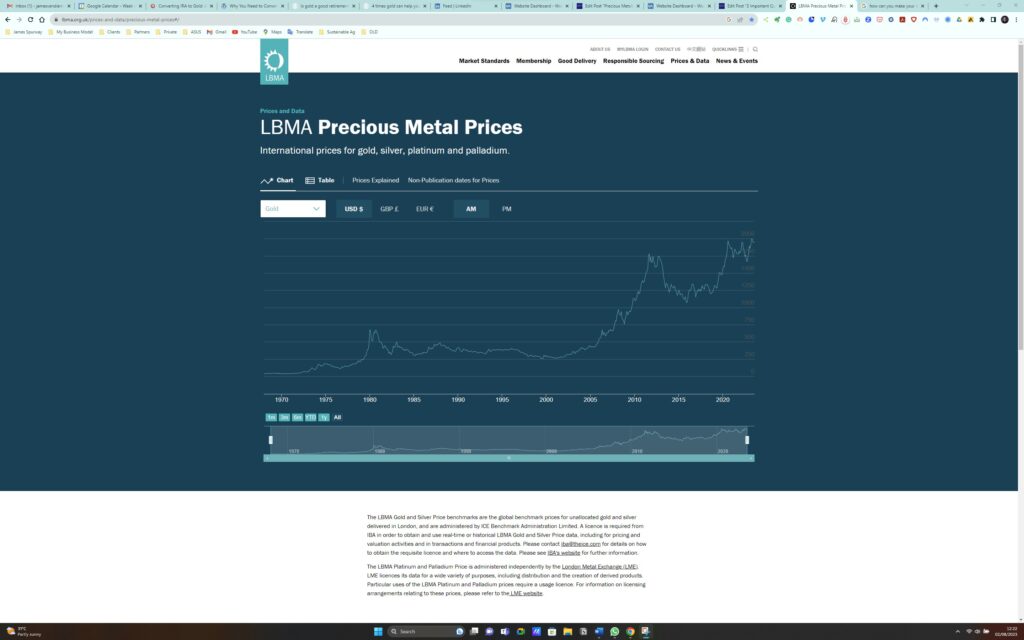
To retire with confidence, even in a recession, is the least you should expect after contributing to society for several decades.
Introduction:
As retirement nears, the desire for financial security becomes even more paramount. While you’ve built a solid investment portfolio, it’s crucial to consider assets that can provide stability and protect your savings during economic downturns. In times of recession, investors seek refuge in safe-haven assets, and gold has proven time and again to be a reliable safe harbour. In this blog, we’ll explore how investing in gold can help you retire with confidence, knowing that your wealth is safeguarded even during turbulent economic times.
If you are one of those rare individuals who knows what they want, click the link below and Request the gold IRA guide that persuaded hall-of-fame quarterback Joe Montana to diversify his retirement with gold.
Retiring With Confidence is Your Right. Go For Gold!
Economic recessions can wreak havoc on investment portfolios, causing asset values to plummet.
Americans’ confidence they can live comfortably in retirement has dropped the most since the global financial crisis in 2008, according to a recent report from the Employee Benefit Research Institute and Greenwald Research.
One reason is high inflation, which has reduced both workers’ and retirees’ belief that their retirement preparations will sustain them, according to the research.
Another reason is many feel they do not have enough saved.
However, gold tends to shine brightly during these trying times. Its inverse relationship with other assets, like stocks, means that when equities falter, gold prices often rise. This phenomenon helps preserve the value of your portfolio, allowing you to maintain your retirement plans with confidence.
The Safe-Haven Status of Gold:
Gold’s safe-haven status is deeply ingrained in its history. During periods of economic turmoil, investors often flock to gold as a secure store of value. Its tangible nature and global recognition make it a go-to asset when uncertainties loom over traditional markets.
As a middle-aged couple preparing for retirement, incorporating gold into your investment strategy can provide a much-needed buffer against potential economic shocks.
Diversifying with Gold:
Diversification is a key principle of risk management. By diversifying your investment portfolio with different asset classes, you can spread risk and reduce the impact of market fluctuations. Gold’s low correlation with traditional investments, such as stocks and bonds, makes it an ideal addition to your retirement holdings.
A well-balanced portfolio that includes gold can help you navigate through the highs and lows of the financial markets.
Retiring With Confidence Means Protecting Your Retirement Nest Egg:
As you approach retirement, preserving the value of your savings becomes paramount. Gold’s ability to withstand economic challenges and retain its worth over time makes it an attractive option for safeguarding your retirement nest egg.
By investing a portion of your savings in gold, you can fortify your financial security, providing peace of mind as you transition into retirement.
Gold’s Long-Term Performance:
While past performance does not guarantee future results, gold has demonstrated impressive long-term performance. Over the years, gold has consistently held its value and even outpaced inflation in many cases. For retirees seeking capital preservation and steady growth, gold’s track record makes it a compelling choice.

Conclusion:
As you prepare for retirement, securing your financial future takes precedence. The inclusion of gold in your investment portfolio can offer a safe harbour during times of recession and economic uncertainty. Its historical significance as a store of value and its ability to diversify your holdings make gold an asset worth considering for middle-aged couples looking to retire with confidence. By adding gold to your investment mix, you can enhance your portfolio’s resilience and embark on your retirement journey with greater peace of mind.
Disclaimer: This blog is for informational purposes only and should not be considered as financial advice. Before making any investment decisions, it’s essential to consult with a qualified financial advisor.

